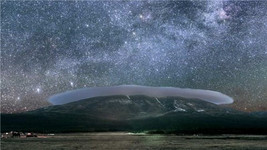The sky is inherently democratic.
夜空,是人类与生俱来的共享资源。
It's accessible, in principle, anyway, by anyone, everywhere, just simply by the act of looking up.
原则上来说,任何人、在任何地方,都可以欣赏夜空的美,你只需轻轻抬头仰望。
But like so many beautiful things around us, it's slipping away from us,
然而,如同我们身边很多其它美丽的事物一样,夜空正在逐渐消逝,
and we haven't even noticed, because we're honestly not really looking.
而我们却未曾察觉,因为,我们根本看都没看一眼。
So what do we look at instead? Well, we look at our phones, we look at our computers, we look at screens of all kinds.
那我们看的究竟是什么呢?我们在看手机、玩电脑,我们注视着各种各样的电子屏幕。
And honestly, we rarely even take the trouble to look up enough to see each other,
说实在的,我们甚至很少费心去抬头注视彼此,
let alone taking that next step to looking up at the actual sky.
更不要说走出房门、抬头仰望真正的天空了。

Now, there's a tendency to think that the loss of our dark night skies is the inevitable outcome of progress, change, technology.
越来越多的人认为,夜空的消逝是科技进步、社会发展的必然结果。
And you know, that's just simply not true. Later on, I'll tell you why.
但这并不是真正的原因。接下来,我将告诉你为什么。
But first, I want to tell you about my experience of the dark night sky.
首先,我想给你们讲讲我自己有关夜空的经历。
I never saw a truly dark night sky until I was 15. I was here, in Arizona.
我直到十五岁时,才见过真正的夜空。当时,我就在亚利桑那州。
I was on a road trip; I pulled over somewhere. I have no idea where I was, except I know what state.
那是一次旅途,我们在一个地方靠边停了车。当时除了州名以外,我对身在何处一无所知。
And I looked up, and the sky was just filled with an impossible number of stars.
就那么不经意地抬头一望,我看到了布满繁星的夜空!
You see, I'm from New York City, and in New York, you can see the moon, you can see a couple of stars.
想想看,我来自纽约,在那个城市,你只能看到月亮和几颗“零星”。
More often than not, they turn out to be airplanes when they land.
而且通常当“零星”降落时,你才发现,它们其实是飞机。



